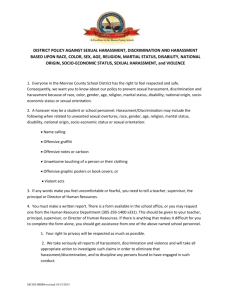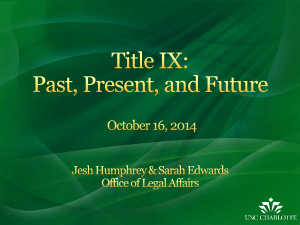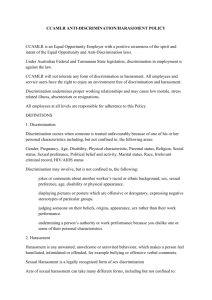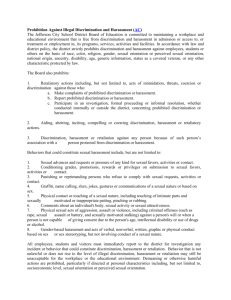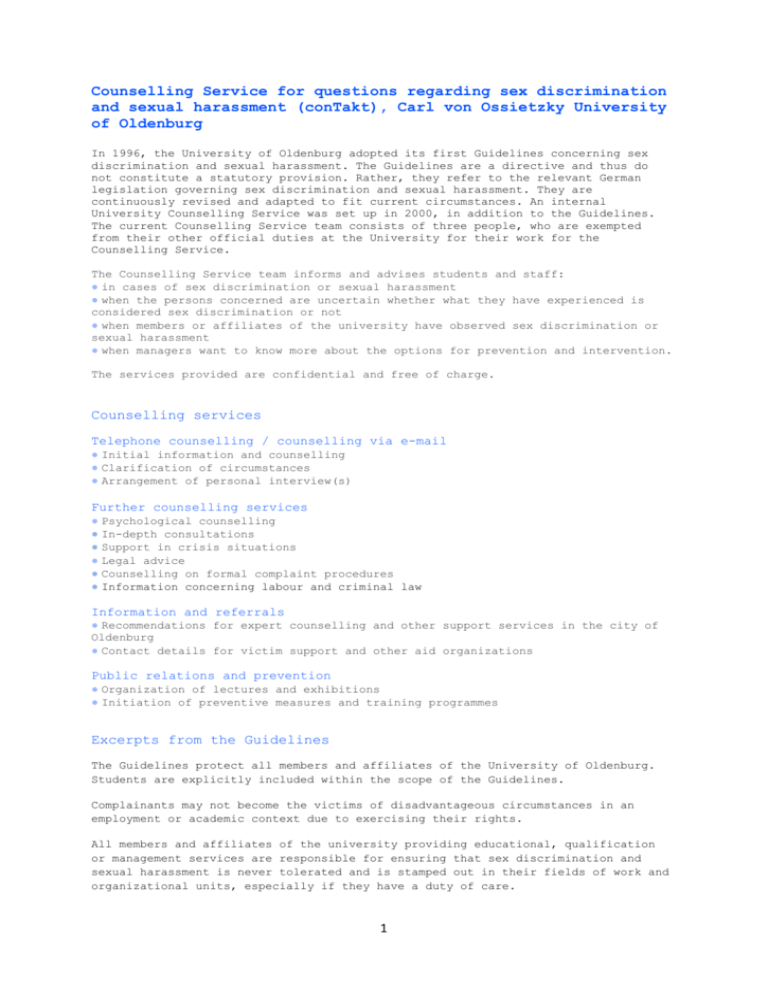
Counselling Service for questions regarding sex discrimination
and sexual harassment (conTakt), Carl von Ossietzky University
of Oldenburg
In 1996, the University of Oldenburg adopted its first Guidelines concerning sex
discrimination and sexual harassment. The Guidelines are a directive and thus do
not constitute a statutory provision. Rather, they refer to the relevant German
legislation governing sex discrimination and sexual harassment. They are
continuously revised and adapted to fit current circumstances. An internal
University Counselling Service was set up in 2000, in addition to the Guidelines.
The current Counselling Service team consists of three people, who are exempted
from their other official duties at the University for their work for the
Counselling Service.
The Counselling Service team informs and advises students and staff:
● in cases of sex discrimination or sexual harassment
● when the persons concerned are uncertain whether what they have experienced is
considered sex discrimination or not
● when members or affiliates of the university have observed sex discrimination or
sexual harassment
● when managers want to know more about the options for prevention and intervention.
The services provided are confidential and free of charge.
Counselling services
Telephone counselling / counselling via e-mail
● Initial information and counselling
● Clarification of circumstances
● Arrangement of personal interview(s)
Further counselling services
● Psychological counselling
● In-depth consultations
● Support in crisis situations
● Legal advice
● Counselling on formal complaint procedures
● Information concerning labour and criminal law
Information and referrals
● Recommendations for expert counselling and other support services in the city of
Oldenburg
● Contact details for victim support and other aid organizations
Public relations and prevention
● Organization of lectures and exhibitions
● Initiation of preventive measures and training programmes
Excerpts from the Guidelines
The Guidelines protect all members and affiliates of the University of Oldenburg.
Students are explicitly included within the scope of the Guidelines.
Complainants may not become the victims of disadvantageous circumstances in an
employment or academic context due to exercising their rights.
All members and affiliates of the university providing educational, qualification
or management services are responsible for ensuring that sex discrimination and
sexual harassment is never tolerated and is stamped out in their fields of work and
organizational units, especially if they have a duty of care.
1
Sex discrimination and sexual harassment that can be classified as the exploitation
of relationships of dependency in training programmes or the workplace and in
university degree programmes is viewed as particularly grave, especially in
circumstances where sex discrimination and sexual harassment occur under the threat
of personal, occupational or academic disadvantage or under the promise of
advantage.
Sex discrimination and sexual harassment most commonly occur against women.
However, in cases when men or transgender individuals are affected, such
individuals must be granted equal protection in accordance with these guidelines.
[Transgender is used here as a generic term for a host of sexual identities and ways of life
involving individuals who do not identify or do not completely identify with the gender
assigned to them at birth.]
Forms of sex discrimination and sexual harassment
The following sample list will help define what falls under sex discrimination and
sexual harassment.
a) The following actions fall under the generic term of ‘sex discrimination’ as
referred to in these Guidelines:
Sexually derogatory remarks, including direct insults
Degrading and/or depersonalized remarks about individuals and/or their bodies
that can be considered to be of a sexual nature, subtle or otherwise
sexually derogatory remarks about the sex life or body of another individual
verbal, visual or electronic presentation of obscene, sexually degrading
images
sexual harassment, i.e. undesirable discrimination related to the sex and/or
the sexual orientation of an individual, with the aim or effect of violating
the dignity of that individual in terms of their sexual identity, thus
creating an environment characterized by intimidation, humiliation,
hostility, degradation or offensiveness
b)
the implementation, creation, copying or use of obscene, sexually degrading
material, such as computer programs and websites on computer systems, flyers
or posters in buildings or on the grounds of the University or other
institutions directly or indirectly affiliated with the University.
‘Sexual harassment’ within the scope of these Guidelines includes:
Undesired sexual acts and/or requests for such acts
Stalking within the meaning of § 238 of the Strafgesetzbuch (Criminal Code;
StGB) and/or coercion within the meaning of § 240 of the StGB in a sexual
context, indirect or otherwise
Physical assault with sexual intent
Rape within the meaning of § 177 of the StGB.
Dealing with formal complaints
The Counselling Service is the competent authority for issues regarding sex
discrimination and sexual harassment (conTakt) and for formal complaints within the
meaning of these Guidelines. Staff must be trained accordingly and be able to
provide information on the legal procedures used within the framework of the
complaints procedure. These Guidelines set out the individual procedural steps.
If there is a breach of the Guidelines and/or the Allgemeines
Gleichbehandlungsgesetz (General Equal Treatment Act) (AGG), the Presidential Chair
has a duty to intervene. The Presidential Chair, after receipt of a recommendation
from the Counselling Service, will decide what measures will be taken against the
accused, taking into consideration all the interests involved and upholding the
principles of proportionality.
2
Key legal principles*
Allgemeines Gleichbehandlungsgesetz (General Equal Treatment Act) (AGG)
Niedersächsisches Hochschulgesetz (Lower Saxony Higher Education Act) (NHG)
Strafgesetzbuch (Criminal Code) (StGB)
* In individual cases, for example those of a personal judicial nature, additional
legislation may be relevant.
Such per
3





